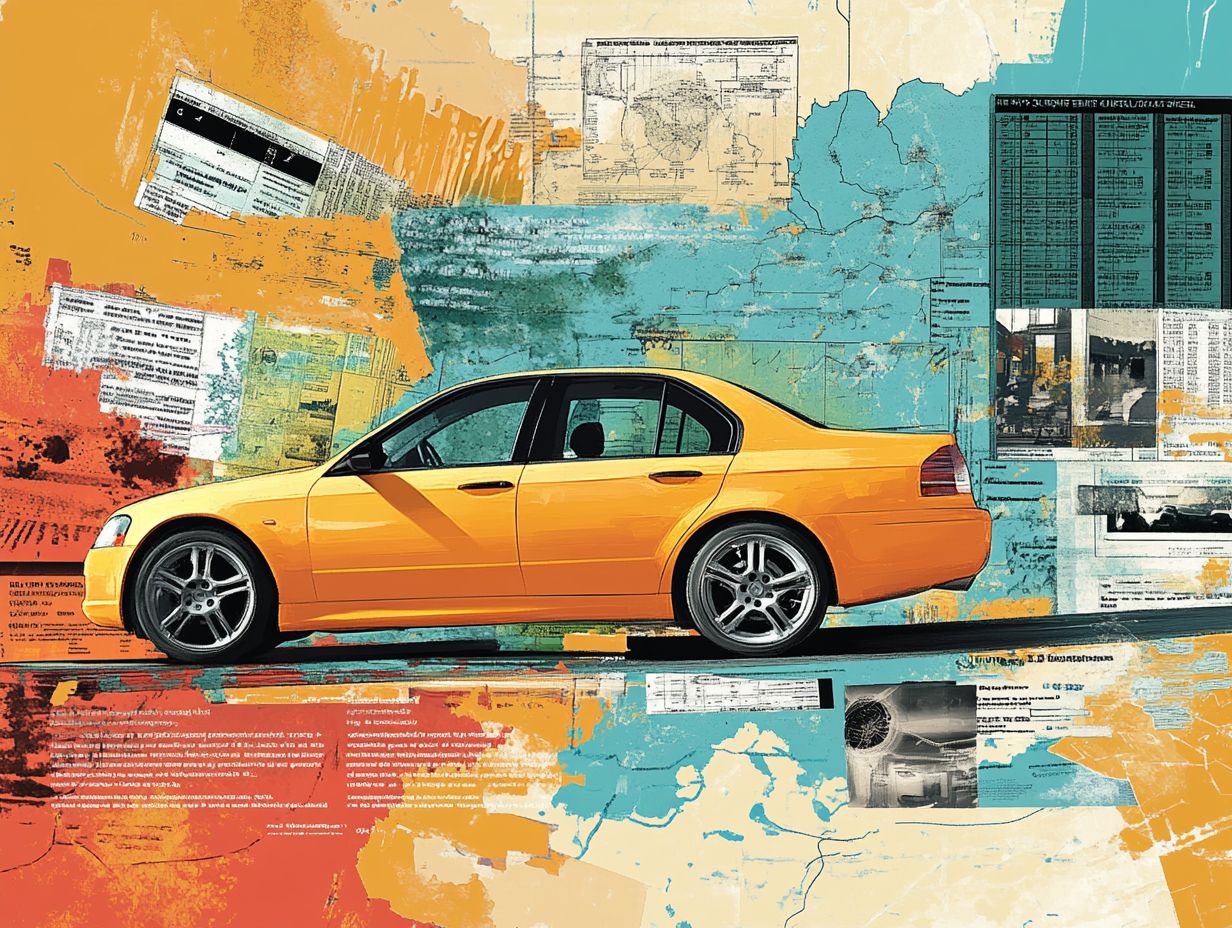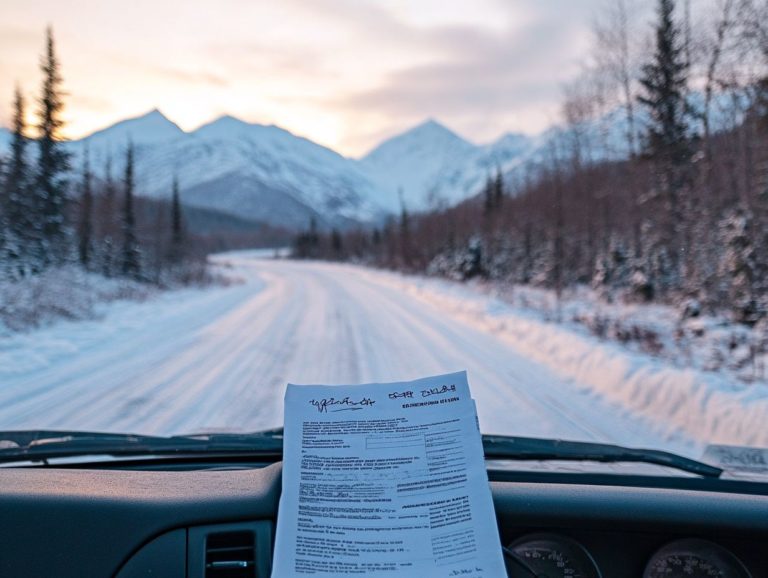New Jersey’s Auto Insurance: Key Facts and Figures
Navigating the world of auto insurance in New Jersey can feel overwhelming. However, grasping its key components can significantly streamline the process for you. You ll find practical tips to save on your premiums, so don t miss out on essential advice!
Understanding mandatory coverage requirements and optional add-ons is crucial for making informed decisions about what you really need. This article delves into the factors that influence auto insurance rates, such as your location and driving history. It also breaks down the various types of policies available to you.
Contents
- Key Takeaways:
- Overview of Auto Insurance in New Jersey
- Factors Affecting Auto Insurance Rates in New Jersey
- Understanding Auto Insurance Policies
- Ways to Save on Auto Insurance in New Jersey
- Frequently Asked Questions
- What are the minimum requirements for auto insurance in New Jersey?
- What is the average cost of auto insurance in New Jersey?
- Are there any discounts available for auto insurance in New Jersey?
- What factors can affect the cost of auto insurance in New Jersey?
- Do I need to have uninsured/underinsured motorist coverage in New Jersey?
- Can I choose my own auto insurance provider in New Jersey?
Key Takeaways:

- New Jersey requires drivers to have mandatory auto insurance coverage, including liability and personal injury protection.
- Factors such as location, driving record, and vehicle type can affect auto insurance rates in New Jersey.
- Understanding key terms and types of policies, as well as utilizing discounts and bundling options, can help save on auto insurance in New Jersey.
Overview of Auto Insurance in New Jersey
Auto insurance in New Jersey is essential for vehicle owners. It is shaped by regulations designed to ensure that every motorist is adequately covered to protect themselves and others on the road.
The state s distinctive insurance requirements mean you must navigate a landscape that includes basic policies, personal injury protection (PIP) coverage, and various liability insurance options.
Let’s dive into the key elements of New Jersey’s auto insurance scene. We’ll highlight mandatory laws and the diverse policies available to meet your specific needs, while also guiding you on how to secure financial protection against potential risks. For further insights, check out the 5 most common questions about New Jersey auto insurance.
Mandatory Coverage Requirements
In New Jersey, the mandatory coverage requirements ensure that you, as a vehicle owner, are protected in the event of an accident. These requirements include automobile liability insurance, which encompasses both property damage liability and bodily injury coverage, along with personal injury protection (PIP) coverage. Together, they create the foundation of the state s no-fault insurance system.
Liability insurance is essential as it covers damages and medical expenses for the other party when you’re at fault, protecting you from significant financial loss. PIP takes care of your own medical expenses and lost wages, regardless of fault. This promotes a faster recovery and financial stability after an incident.
It s critical to meet these legal requirements, as failing to maintain the specified coverages can lead to severe penalties, including fines and potential suspension of your registration. For a deeper understanding of these laws and regulations, consulting the New Jersey Department of Banking & Insurance is highly recommended.
Optional Coverage Options
Beyond the mandatory coverage requirements, you have access to various optional coverage options that can enhance your auto insurance policy. For example, collision insurance covers damages to your vehicle from accidents. Meanwhile, comprehensive coverage protects you against non-collision-related incidents, such as theft, fire, or natural disasters.
In addition to these fundamental coverages, consider options like uninsured motorist coverage and personal injury protection. Uninsured motorist coverage serves as a safety net if another driver doesn’t have sufficient insurance. Personal injury protection covers medical expenses for all passengers in your vehicle.
When selecting these additional policies, it’s essential to evaluate your specific circumstances, such as your driving habits and the car theft rates in your area. For instance, if you frequently navigate urban environments, comprehensive coverage could be particularly advantageous. On the other hand, if you re budget-conscious, take a moment to assess how these add-ons will impact your overall insurance costs.
Factors Affecting Auto Insurance Rates in New Jersey
In New Jersey, various factors affect auto insurance rates. This creates a complex landscape that insurance companies navigate when calculating monthly payments.
Your driving record is paramount; it reveals your history of accidents and traffic violations, serving as a telling indicator of risk. The type of vehicle you choose to insure also carries weight, with aspects like safety ratings (assessments of how well a vehicle protects its occupants) and theft rates impacting your premium.
The insurance market in New Jersey also plays a significant role in determining the average price of different policies. Shaped by local traffic patterns and the state s traffic fatality rates, understanding these elements can give you the power to make informed decisions about your auto insurance.
Location and Driving Record

In New Jersey, your location and driving record are two key factors that greatly influence your auto insurance rates. If you live in urban areas, you may face higher insurance costs due to increased traffic congestion and a higher likelihood of accidents.
On the other hand, maintaining a clean driving record can lead to lower premiums, and you might even qualify for accident forgiveness programs (programs that let you avoid premium hikes after your first accident).
For example, if you re driving in bustling cities like Newark and Jersey City, expect to pay more; the chances of accidents are significantly higher than in quieter areas like Warren County. Insurance companies look closely at accident statistics, showing that urban drivers are involved in accidents more frequently.
Traffic violations can also have a substantial impact on your rates. If you have a history of speeding tickets or DUIs, you might notice a sharp increase in your premiums, as insurers view these behaviors as higher risks.
For instance, a driver with multiple violations could see their rates skyrocket by as much as 40%. This shows why a clean driving record is crucial for anyone looking to keep their insurance costs in check.
Vehicle Type and Usage
The type of vehicle you choose and how you plan to use it are crucial factors that will shape your auto insurance rates in New Jersey. Insurance companies take a close look at aspects like the make, model, and safety features of your vehicle, leading to different insurance costs.
For instance, if your car has a reputation for being a high theft target, you might find yourself paying higher premiums compared to a model renowned for its safety and reliability.
Different vehicle types, such as SUVs, sedans, and luxury cars, come with their own set of implications for insurance. Generally, sedans might offer lower rates thanks to their stellar safety ratings and reduced theft likelihood.
While SUVs can provide better protection in accidents, they may also lead to higher premiums due to increased repair costs. If you re considering commercial vehicles used for business, be aware that they carry unique risks that can affect your insurance rates.
To enhance your chances of securing favorable insurance ratings, opt for models celebrated for their reliability and safety features. Diving into insurance ratings and selecting vehicles with a history of lower claims can be a smart way to further mitigate your costs. Choose wisely, and you could save big on your insurance!
Understanding Auto Insurance Policies
You must understand that auto insurance policies in New Jersey can be intricate and tailored to meet a variety of needs and preferences. It s crucial to grasp the nuances between a standard policy, basic car insurance, and the array of coverage options available.
Each policy type presents unique benefits, and having the ability to interpret these details gives you the power to make informed choices when selecting your insurance provider. Understanding these distinctions will ensure that you find the right protection for your vehicle and peace of mind on the road.
Don’t miss out on the best coverage!
Types of Policies Available
New Jersey provides a variety of auto insurance policies tailored to meet the diverse needs of its vehicle owners, including standard policies, basic policies, and full coverage options. Standard policies typically offer comprehensive coverage, encompassing bodily injury liability and property damage liability. Basic policies deliver the minimum coverage levels mandated by state law.
Full coverage options often present additional benefits like collision and comprehensive coverage, shielding you from damages related to accidents, theft, or natural disasters. Each policy type comes with its own requirements, limits, and costs. It’s crucial for you to carefully assess your unique situation.
Factors such as your driving history, vehicle type, and financial circumstances can significantly influence which policy aligns best with your needs. By understanding state requirements and legal obligations, you can ensure compliance while achieving the peace of mind that comes from being well-protected.
Key Terms and Definitions
Understanding the key terms and definitions related to auto insurance policies in New Jersey is essential for you as a vehicle owner to navigate your insurance options effectively. You’ll encounter common terms like “basic policy”, which refers to the minimum required coverage. You’ll also find various coverage options such as collision and comprehensive insurance. Each serves a unique purpose in protecting you on the road.
It’s important for you to grasp concepts like liability limits, meaning the maximum your insurance will cover for damages, and premium, which is the amount you pay periodically for your policy. Insurance agents are vital allies in your journey, assisting you in selecting the right coverage tailored to your needs. Your rights as a consumer ensure that you are treated fairly throughout the claims process.
By familiarizing yourself with these terms and their implications, you can make informed decisions that best protect your interests while driving.
Ways to Save on Auto Insurance in New Jersey

Discovering ways to save on auto insurance in New Jersey is crucial for vehicle owners like you who want to cut costs without compromising on coverage.
There s a wealth of strategies at your disposal, from exploring the various discounts offered by insurance companies to taking advantage of bundling options for multi-policy savings.
Adopting specific driving habits can lead to lower premiums, giving you even more control over your expenses.
Discounts and Bundling Options
In New Jersey, you have many opportunities to reduce your auto insurance premiums through various discounts and bundling options. Many insurance companies are eager to reward safe driving records and multi-car policies. Completing defensive driving courses can also help you lower your overall insurance costs.
You can take advantage of discounts related to vehicle safety features, low mileage, or even your membership in certain organizations. Bundling your auto insurance with home or renters insurance stands out as a savvy strategy to maximize your savings. This approach not only streamlines the management of your insurance policies but often leads to a significant discount as well.
Talking to insurance agents can unlock personalized savings and better coverage options for you. They ll ensure you’re securing the best possible rate, tailored specifically to your unique circumstances.
Tips for Lowering Premiums
You can lower auto insurance premiums in New Jersey by taking strategic actions. Start with a clean driving record every safe mile counts.
Choose a car with high safety ratings. This smart decision can help lower your premiums. Regularly review your insurance policies to ensure you have the right coverage at competitive rates.
Safe driving habits can reduce accidents, leading to lower premiums. Explore usage-based insurance options that reward your cautious driving with discounts.
Compare insurance quotes regularly. This will help you find better deals tailored to your needs.
Connect with insurance agents for tailored advice. They can address your concerns and guide you toward reduced premiums efficiently.
Frequently Asked Questions
What are the minimum requirements for auto insurance in New Jersey?
In New Jersey, the minimum required coverage for auto insurance is $15,000 for bodily injury per person, $30,000 for bodily injury per accident, and $5,000 for property damage per accident.
What is the average cost of auto insurance in New Jersey?

The average cost of auto insurance in New Jersey is around $1,300 per year, which is higher than the national average of $1,200 per year.
Are there any discounts available for auto insurance in New Jersey?
Yes, there are various discounts available for auto insurance in New Jersey, such as good driver discounts, multi-car discounts, and discounts for taking a defensive driving course.
What factors can affect the cost of auto insurance in New Jersey?
The cost of auto insurance in New Jersey can be affected by factors such as age, driving record, type of vehicle, and location.
Do I need to have uninsured/underinsured motorist coverage in New Jersey?
Yes, uninsured/underinsured motorist coverage is required in New Jersey and provides protection in case you are involved in an accident with a driver who does not have insurance or enough insurance to cover the damages.
Can I choose my own auto insurance provider in New Jersey?
Yes, New Jersey allows drivers to choose their own auto insurance provider. It is recommended to compare quotes from different providers to find the best coverage and rates for your specific needs.




